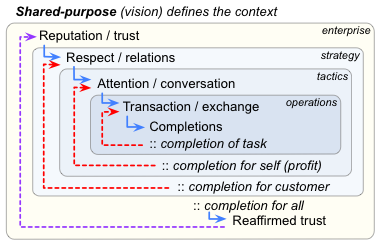On ‘T&C’
When presented with someone’s ‘terms and conditions’ dialog, how often do you read through the whole thing, and only then click the ‘I have read…’ checkbox, and move on? If you did actually read it, do you truly agree to every one of those terms-and-conditions? How often do you have any option to challenge or change those terms-and-conditions?
If you’re like most of us, your answers to all three of those questions would be “almost never”. And yet we all supposedly agree – because however one-sided it may be, if we click ‘No’, the whole business stops right there.
Which, since just about no-one actually agrees with those ‘T&Cs’, yet vaguely pretends that they do, just in order to get anything done, might this not kinda strongly imply that we need a better way to do this?
What I’d suggest is that we need an alternative interpretation of ‘T&C’: not ‘Terms and Conditions’, but ‘Trust and Commitments‘.
Look at it this way, in terms of the Service-Cycle:
The whole cycle depends on mutual trust, mutual commitment, centred around the shared-values and the service-provider’s value-proposition, defined in terms of the vision, values and success-criteria of the shared-enterprise.
In other words, to make it work, and to make it continue to work, the whole relationship depends on each party doing everything they can to create and maintain mutual trust and mutual commitment.
But to be blunt, the usual terms-and-conditions – especially the wildly one-sided yet unchallengeable form that we so often see in those dialogs – is more like a declaration of absence of trust, of absence of commitment: a demand for a one-sided ‘right-to-evade-all-responsibility’. Many of them purport to be a kind of ‘peace-offering’, but bizarrely framed in the form of a declaration of war… Which is not exactly likely to help in either creating or maintaining the trust or commitment that’s needed to make the relationship work.
So in your organisation, whenever you see any reference to ‘terms and conditions’, reframe them as ‘trust and commitments’:
- What mutual responsibilities are needed to make the service viable, and thrive for all parties?
- What are the mutual commitments needed to support those mutual responsibilities?
- What else is needed to support mutual trust between all parties and stakeholders in the service?
- How do these responsibilities, commitments and trust support the overall aims of the shared-enterprise?
Given that, how would you rewrite your organisation’s ‘terms and conditions’ texts to more strongly support that trust and commitment? What governance would you need to support a better and more honest alignment, from all sides, to those aims?
Something worth thinking about, perhaps? – and perhaps even more, worth putting into urgent action?
Over to you for comment, anyway.

Leave a Reply